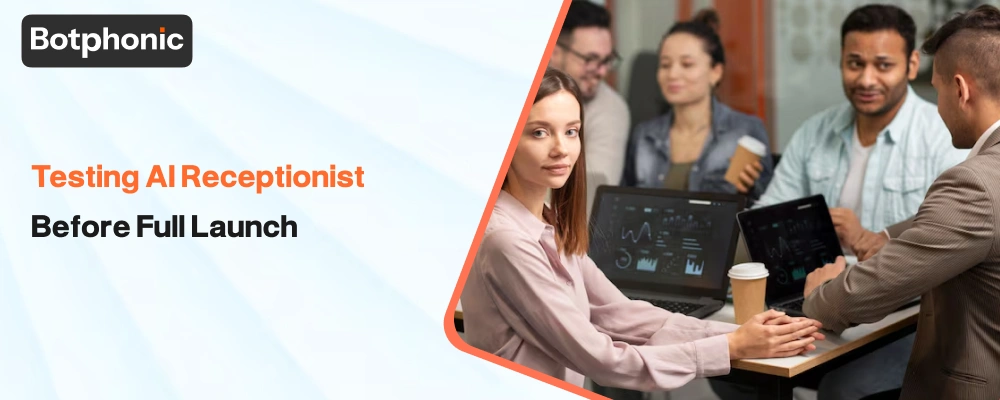
Summarize Content With:
Quick Summary
Testing the AI receptionist before full launch is one of the critical tasks. It’s really important to know why you need to test it before launching, what its measurable benefits are, and how to run effective AI receptionist testing.
In this guide, we will be reading all the aspects mentioned here, and the gradual process of testing an AI receptionist, along with its common issues. We will also discuss how to avoid those mistakes and one of the best AI receptionist services.
Introduction
Are you missing important customers because your receptionist is not able to keep up with you? Or there might also be times when you have lost valuable clients because of unanswered calls after hours. But did you know that with the advanced development in technology, AI receptionist are actively participating in these duties and helping businesses qualify leads effectively.
In this guide, we will learn how to properly perform AI receptionist testing before its full deployment, which will help you ensure that every call is handled smoothly and 24/7 from day one.
Why Test Your AI Receptionist Before Launch?
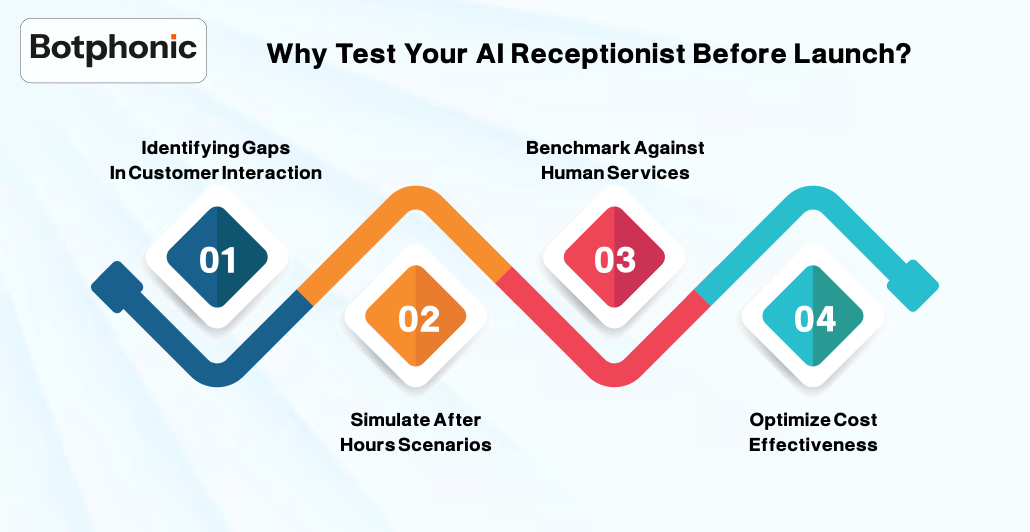
Launching an AI receptionist without even proper testing is like opening your business’s doors to clients without even training your staff properly. It might not feel like a big deal in theory, but when thinking about it practically, it’s the worst decision you could ever make. These small, unthinkable decisions might lead you to lose revenue and unhappy customers. Having a receptionist who doesn’t have proper knowledge might overwhelm your customer with way too many unnecessary details.
Testing effectively helps you evaluate whether your virtual phone receptionist is capable of:
- Answering with natural and conversational responses.
- Handling a large number of calls consistently.
- Integrating smoothly with CRM and scheduling tools.
- Offering a positive customer experience.
The Benefits of Careful Testing
By running a pilot phase, companies can simply assess not just AI receptionists’ technical functionality but also their customer reception. Some of the key advantages include:
- Identifying Gaps in Customer Interaction: AI systems are required to understand varied accents, tones, and phrasing. Testing them ensures that they can handle real-world diversity.
- Simulate After-Hours Scenarios: Several businesses are required to have an after-hours receptionist who helps capture leads and manage emergencies. Testing them at different time intervals shows how well the system is able to adapt as per customers’ changing needs.
- Benchmark Against Human Services: Comparing your AI to a traditional telephone reception service or live phone answering service aids you in deciding whether to adopt a hybrid approach.
- Optimize Cost-Effectiveness: Small businesses usually struggle with staffing and training. Testing an affordable virtual receptionist allows users to measure savings without compromising on service quality.
Trial Options and Hybrid Approaches
Most providers are now offering a call answering service free trial, which gives businesses a chance to compare:
- The speed and accuracy of an AI system.
- Warmth and empathy of a human receptionist.
- Cost-benefit balance between automation and human support.
Many companies prefer to blend both components. They use an AI receptionist as the primary conversational virtual receptionist and switch to a human backup when calls are complex.
Try Botphonic’s AI receptionist and feel the human-like difference.
Start Your Risk-Free Trial Today!!Step-by-Step AI Receptionist Testing Process
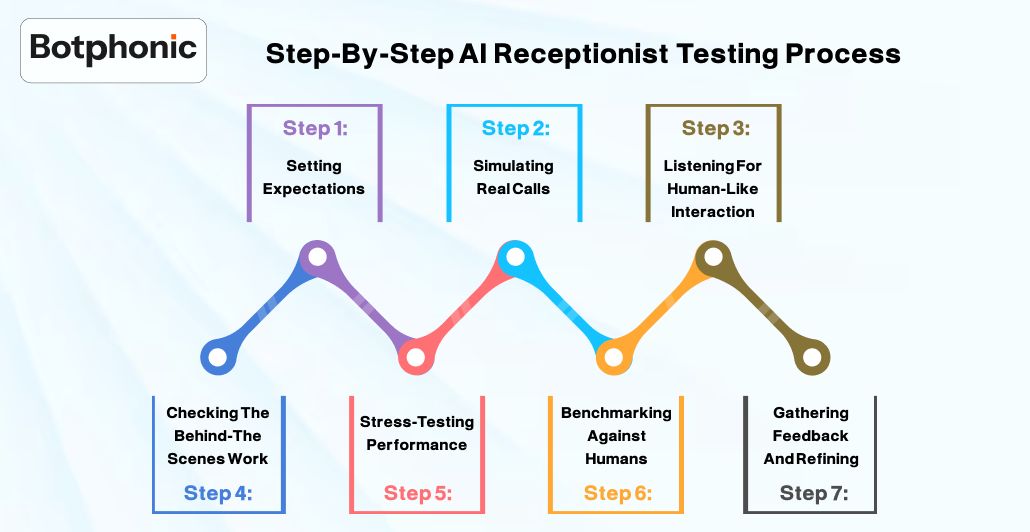
Unwinding your journey of finding and testing one of the best AI receptionist solutions is not like flipping a switch, but it’s about how it’s going to transform your business. Each stage that you will be going through ensures that the system is ready to deliver real value to your business.
1. Setting Expectations
Every business has its own needs, differing from one another. Some businesses want their AI call assistant to manage daily inquiries, whereas others expect them to be a fully capable 24/7 virtual receptionist. To define what success is, some make their objective as a reduction in missed calls and improved appointment bookings, whereas some focus on ROI and enhanced customer satisfaction.
2. Simulating Real Calls
By creating simple scenarios, such as late-night emergencies for an after-hours virtual receptionist or a new client inquiry for business phone answering. Just think of it as a rehearsal before the real big show. With this, you can see how the AI virtual receptionist is performing in contexts.
3. Listening for Human-Like Interaction
A true conversational virtual receptionist should be capable of sounding professional, empathetic, and natural. With trials, you are not just evaluating its accuracy but also if AI is able to make your customers feel valued, similar to a live answering service.
4. Checking the Behind-the-Scenes Work
An AI receptionist is not just for conversations, but it should also be capable of cooperating with your tools. Is is able to log details into your CRM? Can it sync with your calendar? A strong virtual receptionist phone answering service merges effortlessly with your existing systems.
5. Stress-Testing Performance
Once you have the basics clear, start pushing the system to its limits and know its efficiency. High call volumes, off-hours calls, and varied accents, all these components together evaluate whether the AI can truly perform like a 24/7 phone answering service.
6. Benchmarking Against Humans
AI is not meant to exist alone. When comparing it to a telephone reception service, usually a few of the best call answering service offer a free trial to show actively whether a hybrid model will work better or not in the business.
7. Gathering Feedback and Refining
Ensure to gather valuable insights from real users. For instance, customers, staff, and even test callers. Their feedback will help you confirm that your remote receptionist services are feeling polished, professional, and always ready for prime time.
Moving with these steps ensures that businesses are transitioning from uncertainty to confidence. Instead of being underconfident and asking, “Will this really work?”, businesses can say with certainty: “Our AI receptionist testing is perfectly done and optimized.”
Common Pitfalls to Avoid During Testing and How to Avoid Them
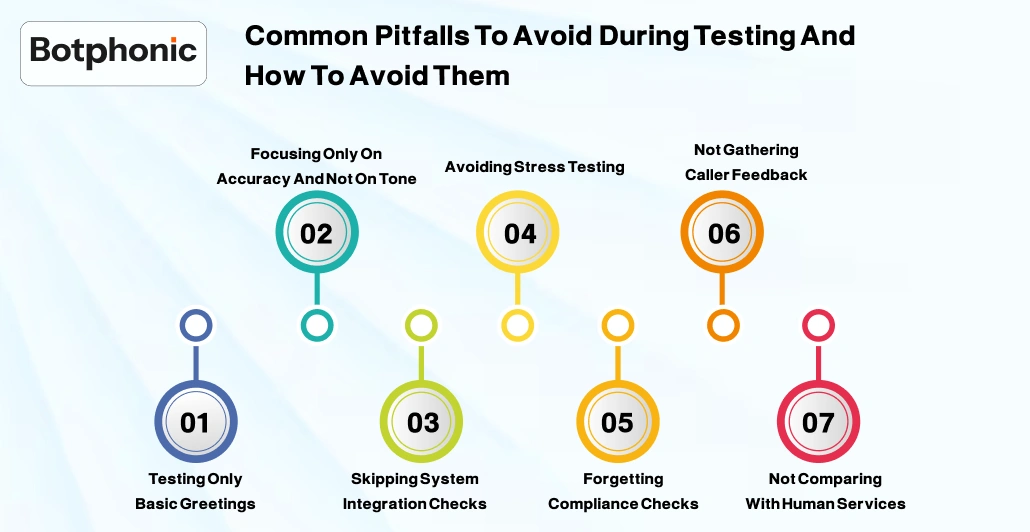
Testing an AI receptionist can help you unlock numerous benefits, but only when it’s done thoroughly, not just for the sake of it. Many businesses often skip critical steps, which in the end leads to disappointing results.
1. Testing Only Basic Greetings
Some businesses tend to forget they might need a customized number of greetings for varied customers. Moreover, they only test the AI on simple “hello” and just stop there. Whereas, when there’s a real customer, they might call with a complex issue.
2. Focusing Only on Accuracy and Not on Tone
Even if the agents can speak the right words as added in its data, if it’s speaking robotically or unnaturally tone, it will obviously feel impersonal. Customers’ positive experience heavily relies on warmth, similar to the correctness of words.
3. Skipping System Integration Checks
AI receptionists are not just about calls and messages, but also their connections. Without testing CRMs or other scheduling integrations, businesses might lose leads or sometimes even duplicate bookings.
4. Avoiding Stress Testing
The AI system you have opted for might easily handle five calls but fail when those five calls come in at once. Without proper stress testing, you won’t know if it’s capable of becoming a 24/7 phone answering service.
5. Forgetting Compliance Checks
Unlike traditional telephone reception services, AI receptionists are not just designed to meet compliance standards automatically. Overlooking privacy protocols and data handling can expose businesses to threats and bigger risks.
6. Not Gathering Caller Feedback
Testing the AI system internally, within your own team, is not enough to evaluate. If you are not asking real callers about the virtual phone receptionists and how it’s making them feel, then you are just launching a solution that even you don’t know when it can frustrate customers.
7. Not Comparing with Human Services
Many businesses often skip benchmarking against call answering service free trial. Without even identifying this, it’d become difficult to know which model benefits you the most: Hybrid or AI alone?
Read about AI receptionists testing common pitfalls, let’s see a quick reference table, reading more about them, their consequences, and how you can actually fix them.
Quick Reference Table
| Pitfall | What It Leads To | Why It Matters | How to Fix / Avoid It |
| Testing only basic greetings | AI fails during complex or emotional calls | Customers lose trust, especially when relying on an after-hours virtual receptionist | Include real-world scenarios, such as urgent requests, billing issues, and rescheduling, during testing. |
| Focusing only on accuracy, not tone | Conversations sound robotic or cold | A poor conversational virtual receptionist experience can hurt your brand image | Evaluate tone, pacing, and natural language; refine scripts to feel human-like. |
| Skipping system integration checks | Missed CRM updates or double bookings | Your virtual receptionist phone answering service becomes more work instead of less | Test integration with CRM, scheduling tools, and messaging systems before launch. |
| Avoiding stress testing | System crashes during peak hours | AI can’t act as a reliable 24/7 phone answering service when you need it most | Simulate high call volumes and after-hours scenarios to ensure scalability. |
| Forgetting compliance checks | Data privacy violations | Risk of legal issues that a seasoned answering service company would avoid | Review privacy policies, call recording laws, and industry compliance before deployment. |
| Not gathering caller feedback | Unnoticed gaps in customer satisfaction | Without refinement, your AI phone agent won’t meet expectations | Collect input from staff and real callers; iterate scripts and responses accordingly. |
| Not comparing with human services | Limited perspective on performance | You may miss out on a hybrid model that blends AI with a live receptionist for small business | Run a call answering service free trial or test live answering services to benchmark AI performance. |
Measuring Success: KPIs for AI Receptionist Testing
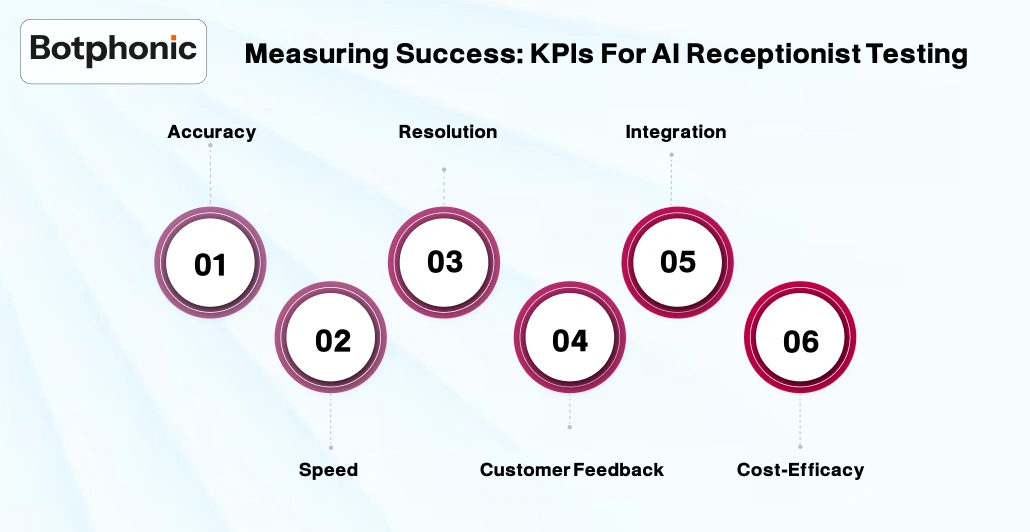
Testing your AI call assistant is not just about them answering the routine queries but proving how it’s going to operate in business. Ensure to keep an eye on these signals:
- Accuracy: Are calls getting handles quickly? Or if the system is able to share true information as added.
- Speed: How fast is it able to pick up the call? If it’s a 24/7 virtual receptionist, it shouldn’t keep the client waiting.
- Resolution: Is it able to solve problems without any human intervention?
- Customer Feedback: Are callers impressed with your AI receptionist? It should feel friendly and professional if it’s an effective conversational virtual receptionist.
- Integration: Is it able to update your CRM and calendar seamlessly? A smart virtual receptionist phone answering service should be able to work behind the scenes as well.
- Cost-Efficacy: If AI is able to help you save money, compared to live answering services?
Why Choose Botphonic AI Receptionist Service?
Choosing the right approach AI receptionist testing, it helps in transforming a business’s way of operation. It actively aids in managing calls and customer interactions. With the Botphonic AI-powered receptionist, you will gain not only an AI receptionist but also an assistant who helps a 24/7 virtual receptionist. Moreover, it never misses a call and responds naturally, keeping the workflow seamless. It can effectively adapt to businesses’ specific needs, whether it’s managing high call volumes or providing after-hours call management along with effective lead qualification.
Whether you are performing stress testing or voice quality, Botphonic excels in both. Also offers multilingual support and numerous voice templates that can be customized as per your company’s tone and voice.
Conclusion
AI receptionist testing is one of the main aspects. Integrating an AI receptionist in your workflow is not just about its efficiency after deployment, but also how it can effectively prove its worth. Although we read why we need to test an AI receptionist before launch, there are several benefits that encourages quick testing. Having a free trial of AI receptionist services allows to determine which method to approach, whether it should be a hybrid approach, where human and AI systems are working together, or AI is capable of working alone.
Avoiding the common pitfalls during testing allows users to evaluate it perfectly. Ensure that a measuring KPI checklist is used, which ensures smooth evaluation. Moreover, it aids in making rational decisions.

